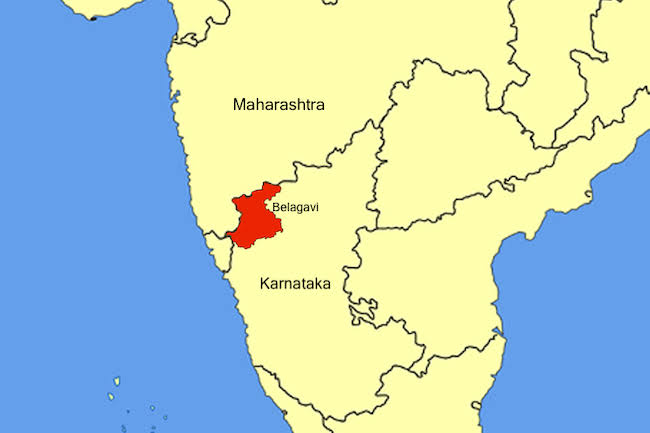Belagavi district which is part of Karnataka state as of today, is a matter of dispute between Maharashtra and Karnataka States since Independence.
In the pre-independence period India mainly had two provinces – Princely states and British provinces. There were few Princely states in South India namely, Mysore, Hyderabad, Goa, Madras, Kolhapur and Deccan states and Bombay province. Remaining part of South India belonged to the British provinces. When the reorganisation act was passed in 1956 on the basis of linguistic and administrative lines, Mysore state got few districts from Hyderabad, Bombay province and few from Madras province. With all these districts Mysore state was formed which was later renamed as Karnataka in the year 1973.
With all the districts from different states, Belagavi is the place which is the border city of Maharashtra and Karnataka which is always in dispute. Maharashtra state has always been claiming that Belagavi belonged to their territory because that city consists of mainly Marathi speaking people.
The demand for Belagavi has been since independence and to push the demand further Maharashtra Ekikaran Samiti (MES) was formed in Maharashtra and it has been fighting for over 800 villages till date.
After the Reorganisation state act, 1956, Belagavi was included within the state of Karnataka and Senapati Bapat, a leader from Maharashtra sat on a hunger strike seeking that a commission be formed to address that dispute. The strike had failed and no commission was formed.
In 1966, state of Maharashtra made a petition to the center and as a result Mahajan Commission was formed. The commission was headed by the third Chief Justice of the Supreme Court of India, Mehr Chand Mahajan and made few recommendations. They were, though Belagavi city consisted of majorly Marathi speaking people but the city was surrounded by Kannada areas on the three sides and Maharashtra villages on the 4th side and also the majority of lands in and around Belagavi belonged to the Kannadigas. Hence the commission though rejected Maharashtra’s demand of reorganising Belagavi into the state of Maharashtra but stated a few villages that should belong to Maharashtra and few which should belong to Karnataka. Another surprising recommendation of the council was regarding Kasargod which is located in the borders of Karnataka and Kerala which should belong to Karnataka. Again Maharashtra government was not happy with the recommendations and Kerala government also refuted the recommendations of the report. Though the Karnataka government accepted the recommendations and was ready to implement it, but till date it has not happened.
The cold war was in motion until 2006 when the Maharashtra government approached the Supreme Court under Article 131 of the Constitution and in its petition said that almost 814 villages in various districts of North – Karnataka consists of Marathi speaking people and there is a feeling of insecurity amongst them. The matter is still subjudice in the Supreme Court.
Karnataka government has two assembly building to conduct their regular sittings – one is the main Vidhana Soudha in Bengaluru and the other one is Suvarna Vidhana Soudha in Belagavi to conduct winter sessions. In 2012 Suvarna Vidhana Sabha was established which took the dispute to another level. Since 2012, in every winter session the MES and its activists gather in front of the main building to create hindrance for the sitting to continue in peace.
The recent winter session of Karnataka state assembly began on December 13th, 2021 and the activists of MES gathered in front of Suvarna Vidhana Soudha for a protest. Though they gathered they were not given permission by the district administration to protest. Despite the absence of permission to hold the rally, MES activists gathered at the venue and were involved in a confrontation with Kannada activists from Karnataka Navanirmana Vedike. The Kannada activists threw black ink on the MES activists. As a result of this action MES called for a Belagavi bandh on December 14th that is on the next day. Though the bandh received very lukewarm responses, a series of minor incidents occurred.
A Karnataka flag was burnt in protests held in Kolhapur in Maharashtra.
A statue of the Maratha Warrior icon Shivaji Maharaja was smeared in a locality in North Bengaluru by pro-Kannada activists.
In a retaliatory action, Pro-Marathi activists damaged a bust of the Kannada warrior icon Sangolli Rayanna in Angol in south Belagavi on December 17th.
On December 17th Pro-Marathi activists also gathered near Sambhaji circle in Belagavi following the news of the alleged desecration of a Shivaji statue in Bengaluru, with some miscreants throwing stones on Karnataka government vehicles and police vehicles. Many were injured in this incident and few were also arrested by the Bengaluru police.
After all these events, since December 18th prohibitory orders under Section 144 of Criminal Procedure Code, 1973 were imposed where gathering of people is prohibited.
This has now become a political issue where the political leaders of both the states use the social media platform to tell their point of view of the dispute to the world targeting the other state. The dispute has been in motion for 50 years, a petition is pending in the Supreme Court and during every winter session of the Karnataka assembly a new fight is created. A solution must be found to this dispute to bring an end to all the major fights and problems created every year.

